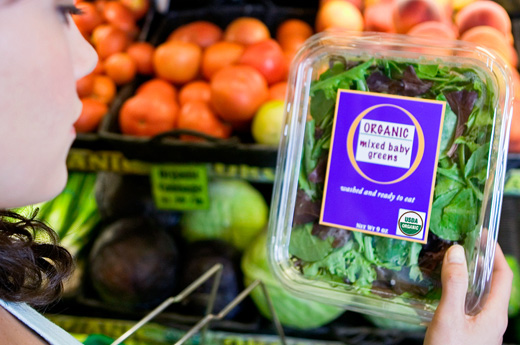
by guest blogger Coach Mark Smallwood, executive director at Rodale Institute
What do Cheerios and apples have in common? They are the latest and very public battlegrounds for the GMO debate. But these two mainstays of American childhood nutrition are headed in opposite directions: While the Arctic apple, genetically modified to not brown when it’s cut, is all but set to be approved for production; original Cheerios is now GMO free. And while the general public is wholeheartedly in support of knowing what is in its food, shoppers are still confused as to what all the labels really mean.
Now some of the very groups who dumped millions into defeating state GMO labeling laws across the country have changed tack and are pushing for a national GMO labeling law; one that requires labels only on GMOs “proved” to cause health problems. The problem? Patents and “intellectual property” laws not only severely restrict how GMOs can be researched, but also have provided an easy way for the companies to discredit study results they don’t like.
While food and seed giants figure out how to take the teeth out of GMO labeling laws before they even happen, there is good news for the more than 90 percent of American consumers who want to know whether or not something contains GMOs: We already have a label.
Certified-organic farmers and food producers can’t use GMOs. Ever. And there are strict regulations in place for certified-organic producers to avoid GMO contamination, including testing. As Melody Meyer, vice president of policy and industry relations at United Natural Foods, Inc., and a Rodale Institute business member, explained recently, “In November 2012, the NOP clarified through formal rule making that testing for prohibited residues in organic products, including GMOs, MUST occur periodically (on an annual basis), and that certifiers must investigate and issue noncompliance notices accordingly to organic operations that fail to meet the requirement.”
In Search of Healthy Food
GMOs are also only one aspect of a toxic food system. Simply choosing non-GMO does not make for healthy food. In the past five years, The American Academy of Pediatrics, the President’s Cancer Panel, and physicians nationwide have publicly advised us all, especially children and pregnant women, to reduce our dietary exposure to synthetic pesticides.
While debate rages on over the “safety” of GMOs, consumers who want to avoid the toxic pesticides and herbicides proven to have negative impacts on our health and wellness (which we’re already carrying around in our bodies) should remember: We already have a label.
Certified-organic farmers are required to start with good design and good management to avoid pest problems in the first place, using naturally derived products only as a last resort. The focus is on creating a healthy balance on the farm.
Organic Is Non-GMO and So Much More
The label isn’t new or sexy, but it is proven and trustworthy. Organic farming is the most regulated kind of farming out there. And organic farms are third-party verified; not only to ensure what they aren’t doing (such as using prohibited materials and practices), but also to ensure they are actually being good stewards of the land and water on which we all rely.
By all means, recognize and support the incredible work that non-GMO groups are doing nationwide (we do) and rally around GMO labeling (we are). But if you really want to take down the GMO giants, champion the organic farmer.
Maria Rodale recently said, “The number one thing that changes minds is when [conventional farmers] see an organic farm that works.” Members of Rodale Institute’s Heritage Society can provide critical support preserving the heritage of agriculture in our nation while promoting and supporting the efforts of the modern organic farmer.
Organic farmers are changing the very makeup of our agricultural landscape for the better, and their label reads “USDA Organic.”
 “Coach” Mark Smallwood has been dedicated to environmental sustainability, efficiency, and conservation for decades. Since joining Rodale Institute in December 2010, he has brought heritage livestock back to the institute’s 333-acre farm, expanded and enhanced its research efforts, and launched “Your 2 Cents,” a national campaign to support and promote new organic farmers. In recognition for his sustainability efforts, Coach was chosen as a messenger for Al Gore’s Climate Project, presenting to more than 15,000 people on the effects of global warming. Last, but certainly not least, as a longtime organic farmer and biodynamic gardener, Coach has raised chickens, goats, sheep, and pigs and driven a team of oxen.
“Coach” Mark Smallwood has been dedicated to environmental sustainability, efficiency, and conservation for decades. Since joining Rodale Institute in December 2010, he has brought heritage livestock back to the institute’s 333-acre farm, expanded and enhanced its research efforts, and launched “Your 2 Cents,” a national campaign to support and promote new organic farmers. In recognition for his sustainability efforts, Coach was chosen as a messenger for Al Gore’s Climate Project, presenting to more than 15,000 people on the effects of global warming. Last, but certainly not least, as a longtime organic farmer and biodynamic gardener, Coach has raised chickens, goats, sheep, and pigs and driven a team of oxen.




Thanks so much! I think that we forget this simple fact: there is already a label out there to protect us and it reads, “Certified Organic.” In this world of crazies, this is one thing that is clear. Thank you for championing this cause for our families, both through your words and through your actions !
And the more people who buy certified organic food, which supports the farmers, the more organic farmers we will have on our land. The new Farm Bill just passed in Congress, (waiting for the House vote) gives millions of our tax dollars to Big Ag corporations and gives almost nothing to organic farmers. So we not only need to let our elected officials know we don’t like this Bill, we also need to do all we can to support our organic farmers. It’s the only way for us to feed our children healthy food.
I support GMO labeling in principle because I think consumers have the right to know, BUT for those us who already buy organics, it’s just not necessary to have the additional label. We also steer clear by avoiding processed foods that are likely to contain GMO ingredients and cook from whole foods in our home kitchen as much as possible. I feel that the fight for GMO labeling will become less important if we can educate others about easy ways to avoid these dangerous products. Thanks for this education!
There are companies out there who only care about selling chemicals and now control seeds. But believe it or not, these big fish are only small fish in a bigger pond. We cannot easily control these chemical fish, but we can control the really big fish; and that is the big food industry. We can control them by what we buy, and if what we buy is only organic, then that is what they will put on the shelves. They are not going to invest money to produce something the consumer is not going to buy.
By avoiding processed foods, GMO, Farm raised, we can control the big food industry; and because they all compete for your purchase, Organic prices will come down and become more competitive.
To clarify- USDA Certified Organic means GMO free, but does GMO free mean USDA Certified Organic, or not necessarily? Thank you for the clarification!
I realize we are talking produce here but, I have recently found out at my local whole foods, that food that has the usda organic label doesn’t nessesarly mean it is gmo free. (I noticed on some cereal boxes that some had a non-gmo label along with the organic while others only had the organic). When I spoke to an employee he informed me that the organic label can be used even if there is only one organic ingredient. I feel really misled, this whole time I go out of my way to buy organic when in reality there could be gmos in my food. I realize now to read labels closer but why do I have to go through so much just to have a product that is not filled with things I don’t want.
It does seem unfair that we have to read every ingredient in our food in order to not get GMO’s. But because they make my allergies so much worst, I do read every ingredient and if only one item is organic, then I don’t buy the product, as it means there are GMO’s in the food. But Corporations who want to make money, more then they care about our health, are not going to go out of their way to let us know that not all the ingredients in that food item are truly organic. We have to be our own advocates for our health.